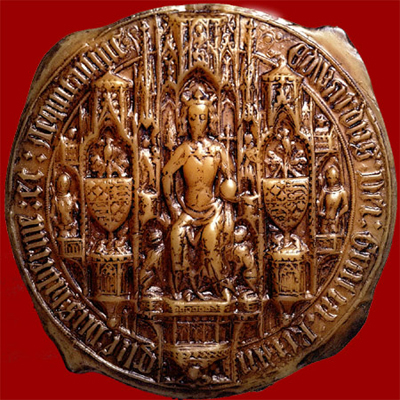
EDWARD III ASSUMES THE TITLE AND
ARMS OF THE KING OF FRANCE, 1340
Translated by C.D.Taylor.
 |
DOCUMENT
EDWARD III ASSUMES THE TITLE AND
ARMS OF THE KING OF FRANCE, 1340
Translated by C.D.Taylor. |
[Translation from the Latin of Robert of Avesbury, De
gestis mirabilibus regis Edwardi Tertii, Ed. Sir E.M. Thompson. Rolls
Series, 1889. p, 309]
Edward, by the grace of God King of France and England and Lord of Ireland, to all the prelates and other ecclesiastical persons, peers, dukes, counts, barons, gentle and simple, dwelling in the realm of France, gives true notice of all the under-written matters.
The high lord king, who has the right to put his will into effect, wishes however his power to be subject to law, ordering each to be given what is his, thus showing that justice and judgment ought to be the preparation of the seat of the king. Since therefore the kingdom of France has by divine disposition devolved upon us by the clearest right owing to the death of Charles of noted memory, the last king of France, brother germane to our lady mother, and the lord Philip of Valois, son of the king’s uncle and thus farther removed in blood from the said king, has intruded himself by force into the kingdom while we were yet of tender years, and holds that kingdom against God and justice, lest we should seem to neglect our right and the gift of heavenly grace or to be unwilling to conform the impulse of our will to the divine pleasure, we have recognized our right to the kingdom and have undertaken the burden of the rule of that kingdom, as we ought to do, resolving with unshakable purpose to act with good and devoted servants, to do justice to all men according to the just and laudable customs of all men, to revive the good laws and customs which were in force in the time of Louis, our predecessor, and to cast out that usurper when opportunity shall seem most propitious. We do not instead to seek our gain at your expense by unjust exactions, such as changes in the coinage or otherwise, since we have sufficient of our own resources, thanks be to God; and in the affairs of the kingdom we do not intend to act precipitately and arbitrarily, but, holding our will in check, we will be guided by the counsel and advice of the peers, prelates, magnates and faithful vassals of the kingdom, as shall seem best for the honour of God, the protection and advancement of the Church, which we revere in the fullness of devotion, and the furtherance of both the public and the private good, regulating our deeds by the grace of God, with the full display of justice. For your honour, convenience, and peace we are in the highest degree concerned, because, God knows, nothing would be more acceptable to us than that by our efforts, especially between ourselves and Christians generally, the Lover of Peace should send his peace, so that the sword of the Catholic princes might be turned against the blasphemers of the Christian name and towards the recovery of the Holy Land, sanctified by the blood of our Redeemer, to which object we strive by the grace of the Holy Ghost.
And whereas we have held out to the lord Philip many loving and reasonable offers of peace, to which he would not respond nor make any reasonable reply, nay rather, levying unjust war against us, he has striven with all his might for the complete subversion of our estate, we have necessarily been compelled to resort to arms, for our defence and recovery of our rights, not seeking the overthrow or depression of the good and the poor but rather striving heartily for their safety and convenience; wherefore we benignly wish that all and each of the natives of the kingdom who will subject themselves willingly to us, as the true King of France according to wise counsel, before next Easter, offering due fidelity etc. to us, as King of France, performing their duties, as our beloved and faithful men of Flanders have already done and have offered themselves as ready to be effective in our service, should be admitted to our peace and grace and to our special protection and defence, and we wish to maintain them, as is proper, and to protect them, without any molestation or disturbance to them either in persons or possessions by us or our servants, in whatever manner carried out, by reason of the former rebellion.
And because the foregoing proclamations cannot easily be notified to each of you individually, we provide that they should be affixed publicly to the outer doors of churches and other public places, so that they may come to public notice, to the solace of our devoted subjects and for the true instruction of those who have been alienated from us by malevolent cancers.
Given at Ghent on the 8th of February, in the first year
of our reign over France and the 14th of our rule over England.
 |
Return
to main page
Go to discussion group © University of York, 2002. Not to be reproduced without permission. |